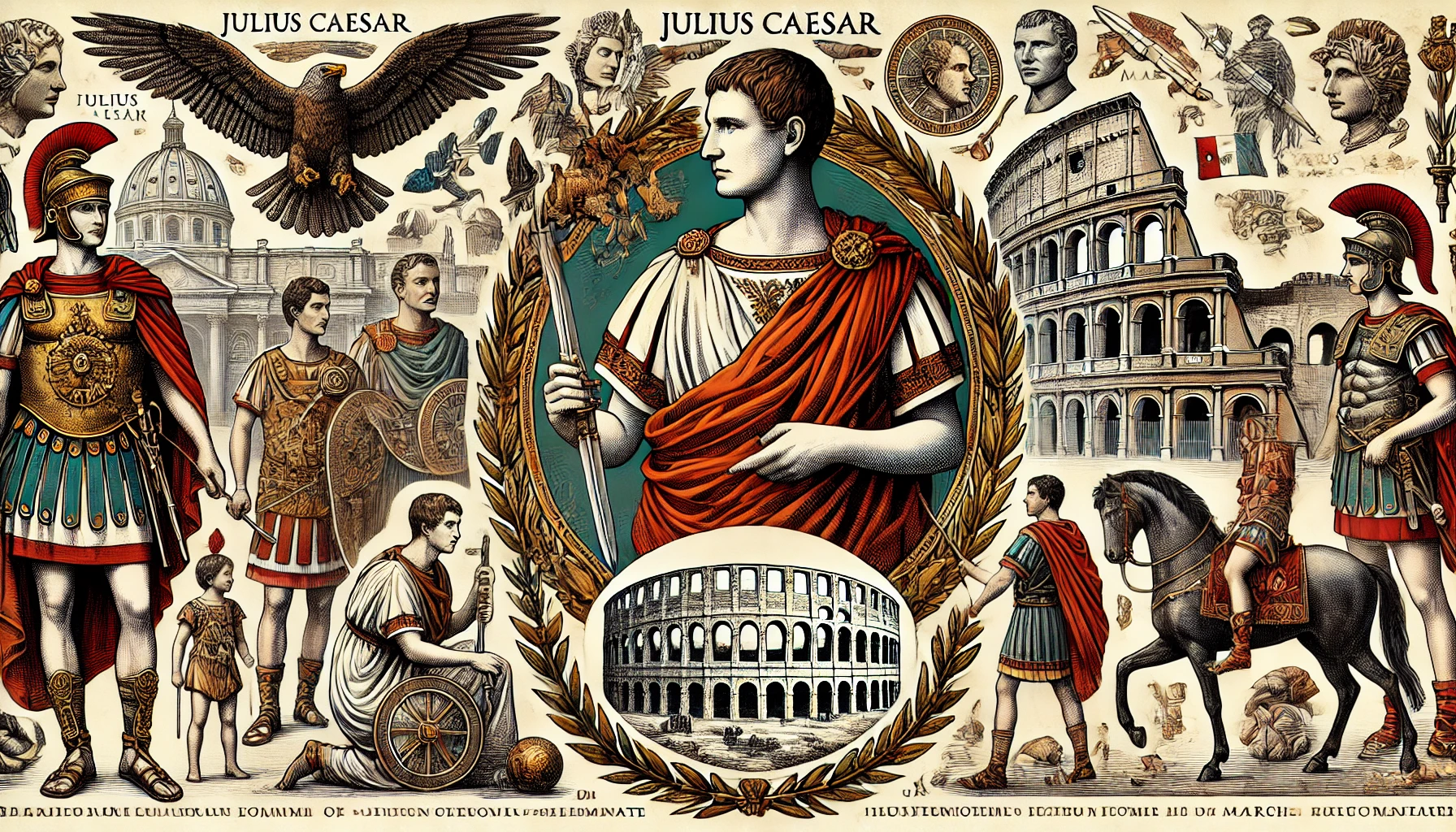Unraveling the Life of Julius Caesar: A Comprehensive Biography and Timeline
Julius Caesar, a name synonymous with power, ambition, and pivotal historical change, continues to captivate historians, scholars, and the general public. From his early life and illustrious career to his shocking assassination and enduring legacy, Julius Caesar’s life offers rich insights into the complexities of leadership, politics, and human nature. This blog explores the intricate details of his biography, significant historical events, and the lasting impact of his life on the Roman Empire and beyond.
Early Life and Background of Julius Caesar
Julius Caesar’s Biography and Early Influences
Gaius Julius Caesar was born on July 12, 100 BC, into the patrician family of the Julii. The young Caesar grew up in a period marked by political turmoil and social upheaval in Rome. His family’s connections and his own ambition propelled him into the political arena early on. Caesar’s biography reveals a man shaped by the powerful influences of his uncle, Gaius Marius, and the political machinations of the Roman Republic.
Julius Caesar’s Timeline: Key Milestones
- 100 BC: Birth of Julius Caesar.
- 84 BC: Marries Cornelia, the daughter of a powerful noble.
- 81 BC: Serves in the military and earns the Civic Crown for bravery.
- 60 BC: Forms the First Triumvirate with Pompey and Crassus.
- 59 BC: Becomes consul for the first time.
- 49 BC: Crosses the Rubicon, igniting a civil war.
- 44 BC: Assassinated on the Ides of March.
Julius Caesar’s Rise to Power
Julius Caesar’s History: Political and Military Accomplishments
Julius Caesar’s history is a testament to his unparalleled strategic mind and political acumen. His tenure as consul and his subsequent governorship in Gaul were marked by significant military campaigns that expanded Rome’s territories. Caesar’s accomplishments during the Gallic Wars, particularly the conquest of Gaul, showcased his ability to lead and inspire his troops.
- Military Campaigns: His campaigns in Gaul from 58 BC to 50 BC not only extended Rome’s boundaries but also bolstered his reputation as a formidable military leader.
- Political Maneuvers: The formation of the First Triumvirate with Pompey and Crassus was a masterstroke that allowed Caesar to consolidate power and influence in Roman politics.
Julius Caesar’s Accomplishments: Governance and Reforms
Beyond his military prowess, Julius Caesar’s accomplishments as a ruler were significant. He implemented a series of reforms that addressed various aspects of Roman life and governance.
- Calendar Reform: Introduced the Julian calendar, which reformed the chaotic Roman calendar system.
- Social and Economic Reforms: Enacted laws that redistributed land to veterans and the poor, and restructured the debt repayment system.
- Centralization of Power: Caesar’s appointment as dictator for life in 44 BC marked a crucial shift in Roman governance, centralizing authority in a manner that would influence the future Roman Empire.
The Assassination of Julius Caesar
Julius Caesar’s Assassination: A Turning Point in Roman History
The assassination of Julius Caesar on March 15, 44 BC, commonly known as the Ides of March, remains one of history’s most dramatic and significant events. Caesar’s assassination was orchestrated by a group of Roman senators who feared his growing power and the potential end of the Republic. Among the conspirators were notable figures like Brutus and Cassius, whose betrayal shocked Rome.
Impact of Julius Caesar’s Assassination
The aftermath of Julius Caesar’s assassination plunged Rome into further civil wars and power struggles. The immediate effect was the disintegration of the fragile political alliances that had held the Republic together.
- End of the Roman Republic: Caesar’s death paved the way for the rise of his adopted heir, Octavian (later Augustus), and the eventual establishment of the Roman Empire.
- Historical Legacy: The assassination highlighted the inherent tensions within the Roman political system and underscored the complexities of power dynamics in ancient Rome.
Julius Caesar’s Quotes and Legacy
Famous Quotes by Julius Caesar
Julius Caesar’s quotes offer a glimpse into his thoughts, leadership philosophy, and rhetorical skills. Some of his most famous quotes include:
- “Veni, vidi, vici” (I came, I saw, I conquered) – a testament to his swift and decisive military victories.
- “The die is cast” – reportedly said upon crossing the Rubicon, signifying a point of no return.
- “Cowards die many times before their deaths; the valiant never taste of death but once” – from Shakespeare’s dramatization of his life, reflecting his views on bravery and fate.
Julius Caesar’s Legacy: Lasting Influence on Rome and Beyond
Julius Caesar’s legacy is multifaceted, influencing not only the course of Roman history but also Western civilization as a whole. His reforms, military strategies, and political maneuvers continue to be studied and admired.
- Cultural Impact: Caesar’s life and deeds have been immortalized in literature, art, and popular culture. Shakespeare’s play “Julius Caesar” remains one of the most performed works, highlighting his enduring influence.
- Political Influence: The term “Caesar” became synonymous with leadership and was adopted by subsequent Roman emperors and even other leaders, such as the Russian czars and the German Kaisers.
- Educational Value: Caesar’s biography, accomplishments, and historical significance are integral to the study of ancient history and political science, providing valuable lessons on leadership, governance, and military strategy.
Julius Caesar’s biography and timeline reveal a life marked by ambition, brilliance, and dramatic events. From his early life and remarkable accomplishments to his assassination and lasting legacy, Julius Caesar remains a pivotal figure in history. By exploring his life, history, and impact, we gain a deeper understanding of the complexities of power and the enduring influence of one of history’s most fascinating leaders. For more detailed explorations of historical figures like Julius Caesar, visit Regent Studies and enrich your knowledge with comprehensive educational resources.
For further reading on Julius Caesar’s life and legacy, you can explore this external source.




